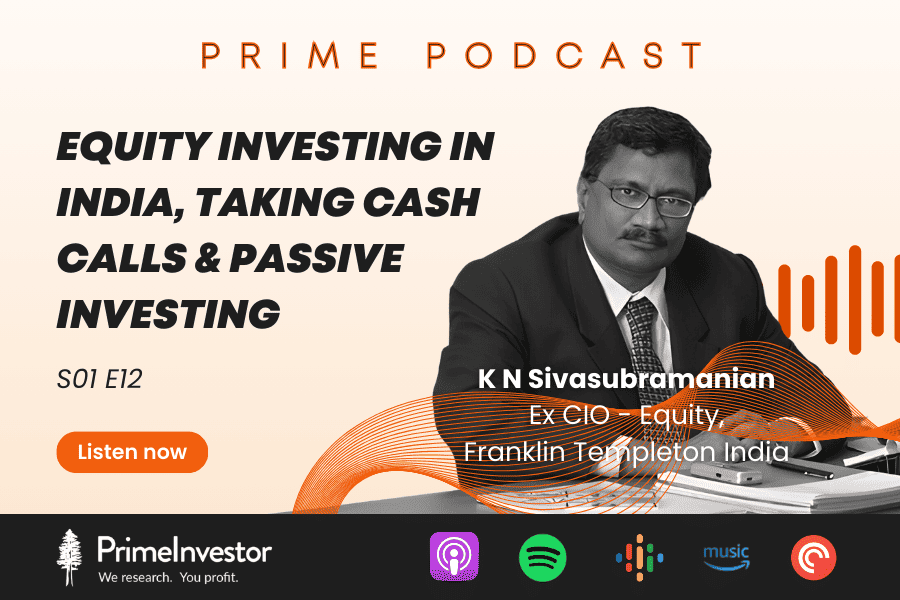Listen to this episode on your favorite podcast app :
What is this episode about?
In this twelfth podcast episode, the host, Aarati Krishnan, interviews K N Sivasubramanian, formerly the CIO of Franklin Templeton India for equities and currently a board member at Sundaram AMC. Sivasubramanian (or “Siva” as he is commonly known) has delivered over 20% CAGR across his fund management career. He is known for his humble personality and quiet success in the field.
The discussion covers global economic factors, the debate around the impact of rising US interest rates on global stock markets, and the contrasting views with India’s robust economic fundamentals. Shiva suggests that caution is warranted for investors, highlighting the influence of global factors on Indian markets and the potential value in fixed income over equities.
The conversation delves into investment strategies, with a focus on the distinction between retail investors and fund managers. Shiva emphasizes that retail investors can consider holding cash and waiting for market corrections, unlike fund managers who are mandated to remain invested. The discussion also touches on the challenges of active fund management in today’s efficient markets and the increasing appeal of passive funds.
Shiva shares insights into potential investment opportunities, advising a bottom-up approach and cautioning against blindly favoring sectors. He identifies areas like financials and engineering as having potential, while also stressing the importance of evaluating individual companies.
The conversation extends to the global perspective, with a discussion on the merits of Indian investors having exposure to US stocks, especially in the tech space.
The podcast interview concludes with Shiva providing insights into managing stock positions, advocating for a gradual build-up based on factors like management quality, opportunity size, upside potential, and liquidity. He touches on the challenges of managing mid-cap funds and emphasizes the significance of a longer-term outlook when evaluating mutual fund performance.
Finally, Shiva shares personal investment perspectives, expressing a preference for mutual funds due to their diversification benefits, but also acknowledging the challenges in evaluating individual funds.

Key segments in the podcast discussion
- Introduction (0:00 – 2:16)
- Contradicting global and local market signals (2:17 – 7:14)
- Should retail investors take cash calls (2 questions in one section) (7:15 – 12:34)
- Should investors own some passive funds in their portfolio (12:35 – 15:33)
- Which sectors should one go for now? (15:34 – 22:35)
- Is exposure to US market necessary? (22:36 – 27:29)
- Should investors book profits to high returning good stocks or just hold? (27:30 – 32:40)
- How fund managers size their positions in stocks (32:41 – 36:41)
- How do you choose funds and how do you take decisions to sell (36:42 – 39:32)
- Sivasubramanian’s best picks and worst picks in his career (39:33 – 44:30)
Don’t have a podcast app? Listen to the full episode here :
Follow the podcast wherever you listen to podcasts :




2 thoughts on “Podcast: K N Sivasubramanian (Ex CIO – Equity, Franklin Templeton India) on equity investing in India, taking Cash Calls & Passive investing”
Thank for another great podcast. Mr Sivasubramanian was so humble and what I was most impressed by is that he’s still in the learning mode, he talks about reading articles in BusinessLine and learning from Mr Pulak Prasad’s book. I have a couple of feedbacks. One, Mr. Sivasubramanian’s audio wasn’t very clear which is unfortunate. For example, I couldn’t understand the author name (Mr Pulak Prasad) very clearly. Please try to improve on this. Two, when your guests make book suggestions or mention an article, it would be great if you can add podcast notes with links to the article or book. Thanks.
Hello Sir, Thanks for your feedback. Yes, we did have audio issues and improving it digitally was causing other problems 🙂 We will work on it and your feedback on podcast notes is also taken. Regards, Vidya
Comments are closed.